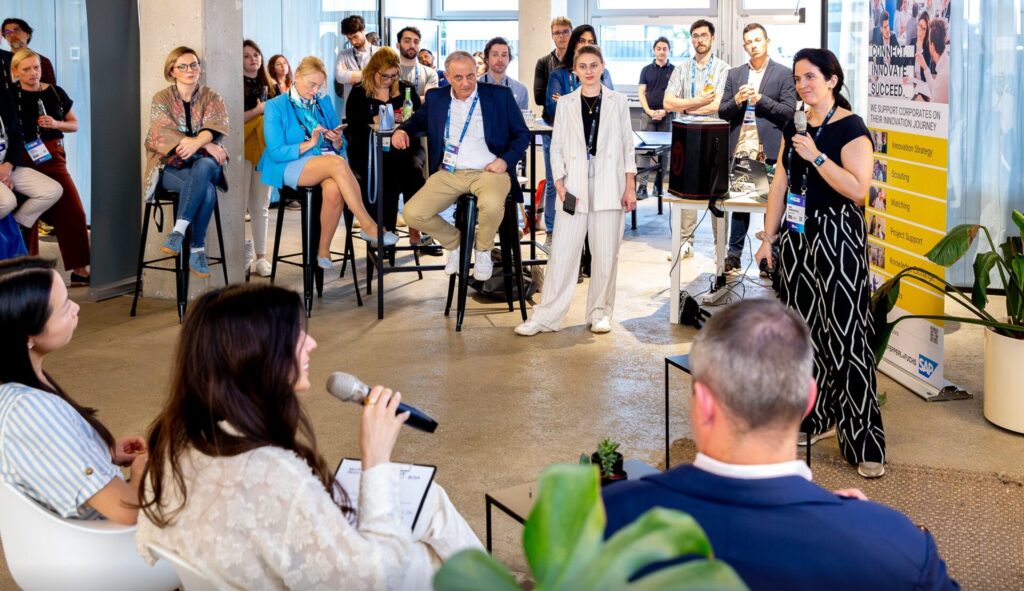
Michael Joe Cini
21st March 2023
Blockchain Healthcare: How could Blockchain change healthcare by 2025?
According to Grandview Research, the global blockchain technology market is valued at $10.02 billion. With a projected Compound Annual Growth Rate (CAGR) of 87.7% projected over the next decade, the blockchain industry appears set for explosive growth. As the blockchain and crypto sectors grow, the role of blockchain healthcare has become of increasing interest to healthcare professionals.
Med-Tech World, bringing together leading companies, professionals, thought leaders, and entrepreneurs in the health technology space, is at the forefront of efforts to answer this question. At its Europe 2022 summit in Malta, the session ‘How Could Blockchain Change Healthcare By 2025?’ was included in the programme. At this panel session, various experts, entrepreneurs, and industry leaders contributed their opinions and views on the future of blockchain’s role in the healthcare sector. Stefan Brugnerotto, Founder and CEO of SAVE moderated the 30-minute session. The panellists included Adrian Niculescu, CMO EMEA at CloudCoin Consortium; Ian Gauci, Managing Partner at GTG Advocates; Alexandra (Lexie) Kolossov, Executive VP for MonteCrypto, and Director of Marketing at Life’s Tough Media; and Clayton Thomas, Founder of ROOT Wellness.
Stefan Brugnerotto led the session with thought-provoking questions and prompts. The panellists shared insights on how blockchain could play an increasing role in healthcare in the coming years. In the paragraphs below, we’ll look at the major talking points from the panel session:
Which region is most likely to have blockchain healthcare make a significant impact before the others?
Adrian Niculescu, CEO EMEA at CloudCoin, with experience in several markets, including Europe and the Middle East provided valuable insight: “Firstly, regarding what you said about the timeline between now and 2025 being short, I would say that it’s a good timeline because now, the number of decades for products and services (to be released into the market) is compressed. And from my experience, this has to come from the government’s level. I believe that the government in Dubai is leading by a distance; they started by putting government-related things on the blockchain. The United States is also putting a lot of effort, but Dubai is leading this shift, currently.”

Clayton Thomas commented on the US’s place in this: “In the United States, we have two industries that are the slowest to respond besides the government, and those are healthcare and the insurance industries because they are so massive. So, if you look at the traditional system as it’s constructed currently, are we going to see any changes by 2025? No. Will there be integration with the blockchain and changes? Yes; because you have companies and I’ll say that from our perspective, being innovative and bringing a new generation of healthcare over the past two years, globally and in the US, people are learning that the old system is not one that they can trust. The blockchain provides a mechanism to track data, share it properly, safely and securely, and it provides a perfect platform digitally to have everything secured.”
Alexandra: “From my side, I think it’s the trust of people that needs to be first taken care of when it comes to medicine or new medical technology, and that comes with education. So, people have to get educated, because most people don’t actually know what blockchain is. We’re still quite confused about the entire technology. It keeps evolving all the time, and no matter if any type of product keeps increasing, that will not help unless we have people that trust and want to buy the product. Even though we focus on transparency and security in blockchain, it needs to come with your customers knowing that they’ve seen the research you’ve done, and that takes years. So, I agree that only till 2030, at least, can we truly integrate and properly educate people about blockchain.”
Clayton, when you’re looking at making significant changes in technology in the healthcare space, are you thinking these are five to ten-year outcomes, or are you trying to gradually bring something to market that is a slight step forward?
Clayton: “In our world, through a global landscape of access to human capital, you’re able to accelerate things really quickly. When it comes to product development for us, Bruce Lee said it best – ‘Be like water.’ Suppose you have the right management and you’re willing to do the work. In that case, you will be progressive, creating a unique opportunity if everyone else is moving slowly. You have the capability of moving fast – but by doing it right and understanding the markets – what we’ll see is that the old systems will eventually die. The systems will get deconstructed, and fall apart, and cheers for that because it’s needed. You can’t go in trying to negotiate with an old system, trying to teach the old dogs new philosophy.”
Alexandra, I know that you advise a lot of companies – on the blockchain, Web3, and the metaverse. Do you have issues sometimes tempering expectations for people that are overly optimistic about jumping in and effecting change?
Alexandra: “Not necessarily, actually, because we are quite straightforward. We tell you what’s possible but also what you’re capable of and what you can create. For example, recently, we were talking to a hospital, and the blockchain could be an amazing system to integrate the database of every single patient that they have, and also VR and metaverse, but that is still to come because it is still just at the beginning. Blockchain, on the other hand, secure and transparent, is not (at its beginning anymore), and it is very possible (to install it in hospital systems).”
We see a lot of collapses in the crypto side of things these days. The average person can conflate the idea of their healthcare records on the blockchain with a lack of security. If you’re working with regulators, how do you get past the conversation of trust?
Adrian: “With blockchain in healthcare, we are in the early stages of adoption. To put it into context, when something new can disrupt a market, professionals and organizations have two opportunities – to become the disruptor, learn more, become an agent of change, or be disrupted. Inside organizations, we as professionals have to discuss with CEOs and boards to explain the benefits of becoming a disruptor and embracing this technology. Also, in every government, there are entities related to digital transformation that handle regulations related to blockchain and post-blockchain technologies. You can work on being a top professional in your field, reach out to these organizations, and work to lead transformation in your country.”
Catch the full panel below!






